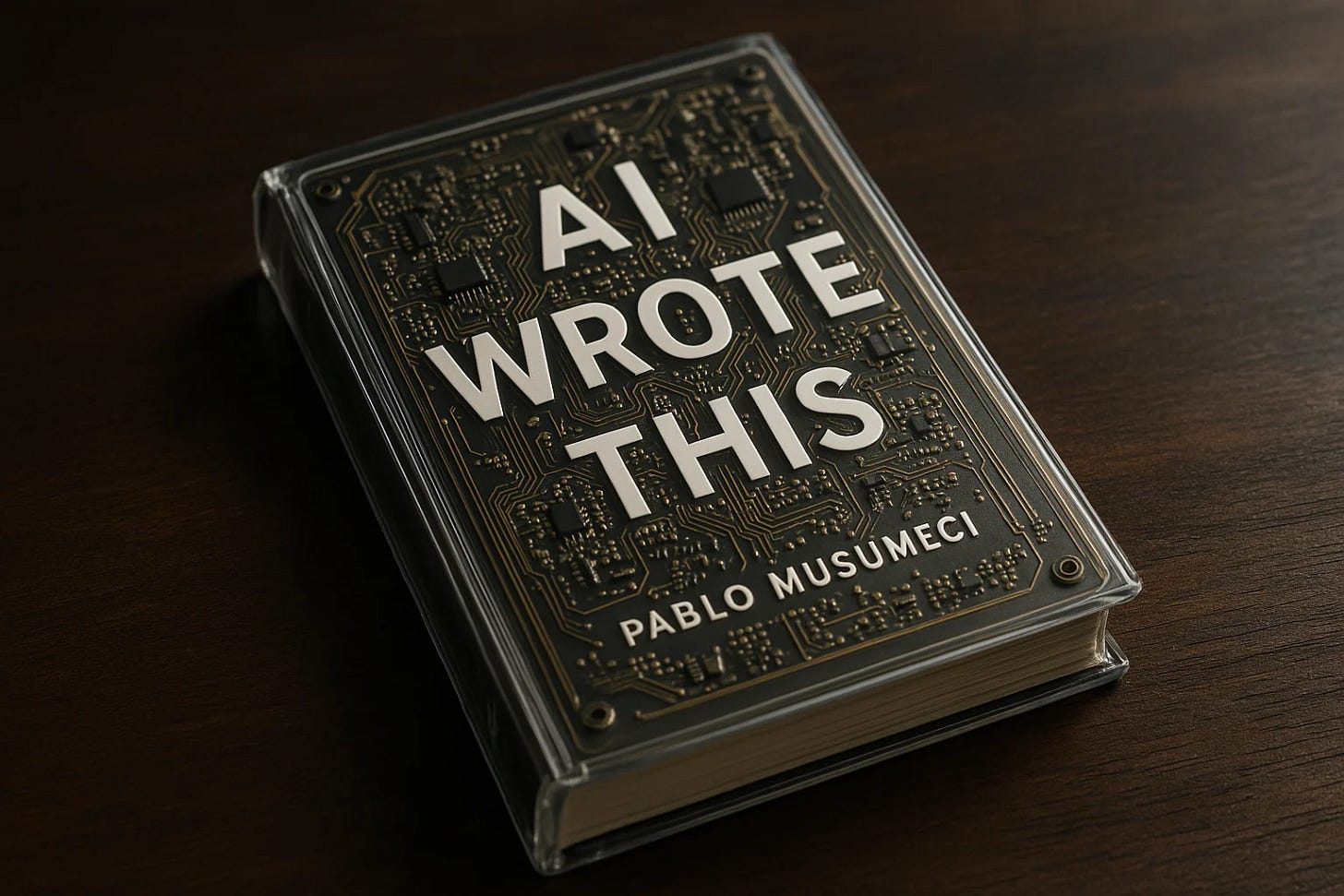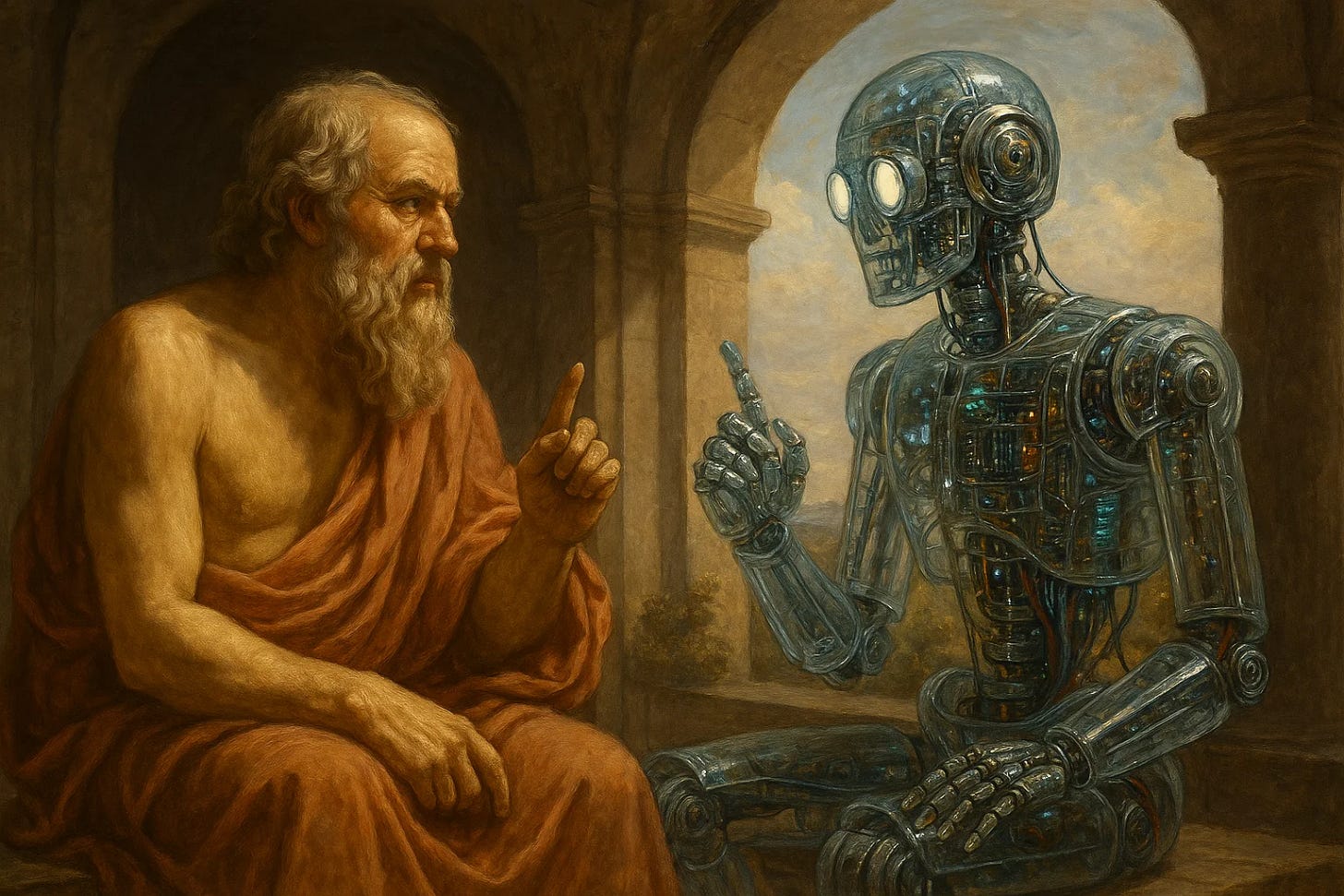Most people are uncomfortable with that. They whisper about AI like it’s a shameful tool to use, something to hide.
Or if they admit it, they downplay it: "Just for spelling," they say. "Only for editing, of course." Go further than that, and it’s like your work doesn’t count. As if you’ve crossed a line by letting a machine touch something sacred.
Some reject it outright, as if that puts them on moral high ground.
Anti-AI sentiment rests on three legs like a wobbly stool. Let’s kick them one by one.
First, the AI Slop. Slop is the shoddy AI content flooding the internet. It’s so easy to spot, it’s all people associate AI with.
In that sense, AI is like Botox. You only notice it when it’s bad.
Second, most people tried it but never seriously invested in it. They used it once, got junk, and moved on. Like hitting three random keys on a piano and deciding music is overrated.
Anyone who’s actually used AI knows it still takes effort to create something good.
If quality matters, simply asking AI to "write a novel" won’t cut it. If it’s just a "Terms & Conditions" page no one reads, sure, go ahead.
Together, the first two points create “The Slop Illusion”: a perception trap where all you make is slop, all you see is slop and, consequently, all you believe AI can do is slop.
But even when AI is used well, something still feels off.
The third—and strongest—pillar of AI-hate is that it hides the struggle. And we humans love the struggle. We only admire what costs something: time, energy, thought, reputation.
Think about it.
I appreciate Michelangelo’s David even though I’ve never held a chisel. When you stand in front of him, you feel it. The time. The obsession. The weight of the marble.
I can imagine this little Italian man working with microscopic precision on something that would last for centuries.
Would I love David if I knew Michelangelo had made him with a magic wand? Maybe, but only if I knew what the wand can really do.
I said at the beginning: this was "written with AI."
But do you know how many drafts it took? Or how much time I thought? That’s what drives the skepticism: you don’t see the work, so you assume there wasn’t any.
Maybe you believe that I pressed a key and AI handed me this essay. Fortunately, or sadly, nothing good comes that easy.
Using AI is more like moving to a new city than pressing a button.
At first, you see the worst. The tourist traps. The filthy streets that smell like piss. The main road is loud, ugly, and somehow always under construction. You walk around and think, this place is horrible.
But then you stay a little longer. You stop checking Google Maps and start to wander.
Slowly, the city opens—like someone who’s been hurt. It gives itself to the ones who wait.
A hidden cafe. A quiet bench that catches the last light of the day. A walk the city reserves only to those who take their time.
It’s the same with AI.
The more time you spend with it, the more it gives back.
You start asking better questions. Eventually, you ask AI to ask you questions so it can help you figure out what you actually want.
After writing with it for months, I no longer feel like it works for me; it works with me.
I use it to show me where I’m lazy. Where I’m vague. Where I’m full of shit.
I decide what’s good. I judge what belongs and what gets cut. And if anything, I’ve become more demanding, more precise, more ruthless with my ideas. Because now, I can fly at the speed of thought.
AI can write, but it doesn’t have taste. It doesn’t know what matters or what’s worth saying twice.
It doesn’t know what I’m trying to say. Neither do I, at first. But together, we carve through the bullshit until the real thing starts to take shape.
Michelangelo believed David already existed within the marble, and his job was to remove the rest. AI gives me the marble. But finding David? That’s on me.
This partnership helps me think more clearly. More deeply. It’s not perfect. But it’s fast, always available, and ridiculously cheap.
It doesn’t care how dumb your question sounds. You can ask anything, as many times as you want.
AI can be that for you: your sparring partner.
The Greek philosopher Plato believed that real understanding comes from dialogue. The back-and-forth. Minds clashing, testing each other until truth emerges.
That’s where AI can shine, if you let it challenge you.
Otherwise, it becomes a desperate friend. Always eager to please, afraid to disagree with you. Until one day, you’ve handed over the reins of your mind without realizing it.
We are lazy thinkers by design and accepting a suggestion is always easier than questioning it. AI won’t change how we think. It will change if we think.
Plato had a similar fear when Greeks transitioned from oral communication to writing.
He thought philosophy happened in conversation. So, in his dialogue “Phaedrus”, he warned that reading and writing could make us dumber.
That we would repeat what we’ve read and mistake it for real understanding. That it would look like wisdom, but it wouldn’t be.
I share a similar fear as Plato. That AI can become too helpful to live without. The same way smartphones made distractions so effortless that we forgot how to focus, AI can make us forget how to think.
Convenience always takes something in return. The easier something gets, the more we lose the muscle we used to train.
A 2025 study in the journal Societies found a strong negative correlation between frequent AI usage and critical thinking skills. Critical thinking here means the ability to analyze, evaluate, and synthesize information to make reasoned decisions.
If you treat it like a sparring partner instead of a guru, it will sharpen your thinking. But if used mindlessly, it will obliterate your judgment.
That’s why waging a war against AI is pointless. The real fight is about consciousness.
AI reveals the user. It multiplies whatever you give it: stupidity or brilliance. It makes dumb people dumber, and sharp minds unstoppable.
I’m not angry at AI for the slop drowning the good stuff. It's true that most auto-AI-generated content is lazy and forgettable. Just like most human work done without care.
I’m in favor of beauty and against junk in anything and everything. In literature, film, music, food, design.
I demand quality and despise apathy. No matter who or what creates or consumes it.
I’m angry at the people who can’t distinguish between fluff and substance.
I’m angry at “Fast & Furious 25” topping the box office while great writers can’t pay rent.
But blaming AI would be just another form of the lazy thinking I’m fighting.
You don’t have to use AI, but someone else will. And if they bring vision, taste and creativity, they’ll leave you behind.
The future isn’t man versus machine. It’s man with machine.
Those who get it won’t just move faster. They’ll go deeper, and get better.
I’m not afraid of that future. I’m writing in it.
AI is my pen. The voice is still mine.







I see “AI” and “David” and i gotta comment 😂. Great post as always.
I find myself loosing my ability/confidence in judgement with my over-reliance on AI. I've been using it to make even simple decisions, such as what food I should eat. Recently, it suggested that I leave a jacket behind in order to decrease my weight on a biking trip. Unfortunately, it was really cold in southern Japan this year, and I ended up having to buy more layers. When I frustratedly confronted the AI on this, it said, “I'll own this mistake. let's work together to remedy this”.
It was an emotionally mature response, but still something didn’t sit right with me. AI was taking the responsibility for the mistakes that I have ultimately made. I relied on the AI too much instead of treating it like an informative friend. Often, it gives me different options when i ask for its opinion on something, then my next prompt is “you decide for me” 😂
It highlights for me one of the beautiful aspects of life, which is to take responsibility for your decisions. Ultimately, our life is made up of our decisions. And although the weight of deciding how to shape your one life can be heavy, of course, it is our greatest gift. I have since shifted my view on the mistakes ive made in my life. They now feel important and precious. With every misstep i take, I stick out my chest and say, “these are my poor decisions and I own it”.